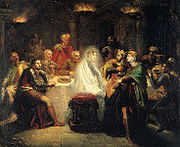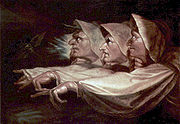Review
| Macbeth: | ||
|---|---|---|
| Review | Extension Activities | The parallel curriculum | External links | |
Extension activities
These activities are designed to extend your understanding of the text. To make the most of them, you need to know the material covered elsewhere in this resource.
The parallel curriculum
In order to extend our understanding of a text, it is sometimes necessary to look beyond it. Looking at factors such as the society within which a play was written, or the career of the author at the time of writing might help you to understand the play itself. The parallel curriculum is useful in this because it helps you to look beyond the 'core curriculum' (which is what you will spend most of your time on in class) to the curriculums of connections, practice and identity.
| The Core Curriculum | The Curriculum of Connections | The Curriculum of Practice | The Curriculum of Identity |
|---|---|---|---|
| Knowledge and understanding.
Knowing the work. (This is the content you will most likely cover in class). Character development
|
All knowledge is interconnected. How does the core curriculum offer insights into the world in which Shakespeare lived? Explore the play in its context:
|
The work of the author: what is the motive of the writer? What is the writer's background? What influences impacted on the author growing up or later in life? How did commercial factors compromise/shape the work? What societal and cultural influences show through in the author’s work?
|
How does this work affect your mood/thought/attitude?
Can you see any link/applications used today? Have these issues got better? Worse? Not relevant? Are the examples the same nowadays?
|
Review
- This section requires you to demonstrate your understanding of the text as a whole by pulling together ideas across the whole text.
- eg: "How is blood used to develop character across the play?", or
- "What are the main symbols in the play and what does Shakespeare achieve through them?"
Harold Bloom in his book 'The invention of the Human', makes the following observations:
|

